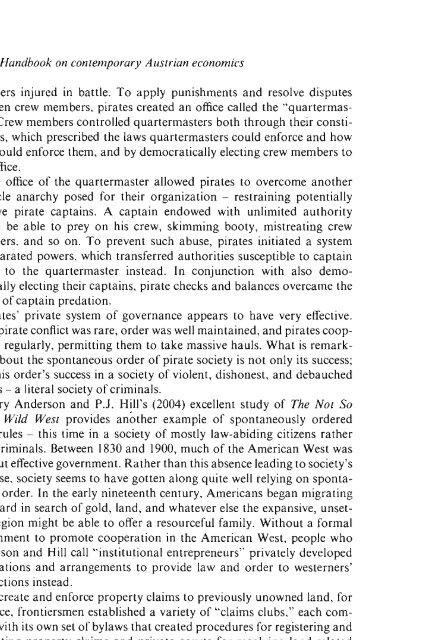Handbook on Contemporary Austrian Economics
Handbook on Contemporary Austrian Economics
Handbook on Contemporary Austrian Economics
Create successful ePaper yourself
Turn your PDF publications into a flip-book with our unique Google optimized e-Paper software.
144 <str<strong>on</strong>g>Handbook</str<strong>on</strong>g> <strong>on</strong> c<strong>on</strong>temporary <strong>Austrian</strong> ec<strong>on</strong>omics<br />
members injured in battle. To apply punishments and resolve disputes<br />
between crew members, pirates created an office called the "quartermaster."<br />
Crew members c<strong>on</strong>trolled quartermasters both through their c<strong>on</strong>stituti<strong>on</strong>s,<br />
which prescribed the laws quartermasters could enforce and how<br />
they could enforce them, and by democratically electing crew members to<br />
this office.<br />
The office of the quartermaster allowed pirates to overcome another<br />
obstacle anarchy posed for their organizati<strong>on</strong> - restraining potentially<br />
abusive pirate captains. A captain endowed with unlimited authority<br />
would be able to prey <strong>on</strong> his crew, skimming booty, mistreating crew<br />
members. and so <strong>on</strong>. To prevent such abuse, pirates initiated a system<br />
of separated powers, which transferred authorities susceptible to captain<br />
abuse to the quartermaster instead. In c<strong>on</strong>juncti<strong>on</strong> with also democratically<br />
electing their captains, pirate checks and balances overcame the<br />
threat of captain predati<strong>on</strong>.<br />
Pirates' private system of governance appears to have very effective.<br />
Inter-pirate c<strong>on</strong>flict was rare, order was well maintained, and pirates cooperated<br />
regularly, permitting them to take massive hauls. What is remarkable<br />
about the sp<strong>on</strong>taneous order of pirate society is not <strong>on</strong>ly its success;<br />
it is this order's success in a society of violent, dish<strong>on</strong>est, and debauched<br />
rogues - a literal society of criminals.<br />
Terry Anders<strong>on</strong> and P.l. Hill's (2004) excellent study of The Not So<br />
Wi/d, Wild West provides another example of sp<strong>on</strong>taneously ordered<br />
meta-rules - this time in a society of mostly law-abiding citizens rather<br />
than criminals. Between 1830 and 1900, much of the American West was<br />
without effective government. Rather than this absence leading to society's<br />
collapse, society seems to have gotten al<strong>on</strong>g quite well relying <strong>on</strong> sp<strong>on</strong>taneous<br />
order. In the early nineteenth century, Americans began migrating<br />
westward in search of gold, land, and whatever else the expansive, unsettled<br />
regi<strong>on</strong> might be able to offer a resourceful family. Without a formal<br />
government to promote cooperati<strong>on</strong> in the American West, people who<br />
Anders<strong>on</strong> and Hill call '"instituti<strong>on</strong>al entrepreneurs" privately developed<br />
associati<strong>on</strong>s and arrangements to provide law and order to westerners'<br />
interacti<strong>on</strong>s instead.<br />
To create and enforce property claims to previously unowned land, for<br />
instance, fr<strong>on</strong>tiersmen established a variety of "claims clubs," each complete<br />
with its own set of bylaws that created procedur~s for registering and<br />
protecting property claims and private courts for resolving land-related<br />
disputes. To protect westerners' cattle and create cooperati<strong>on</strong> for the<br />
purposes of grazing and recovering stray animals, westerners also created<br />
"cattlemen's associati<strong>on</strong>s." Like claims clubs, cattlemen's associati<strong>on</strong>s<br />
also privately provided rules for their members and hired cattle detectives/

















